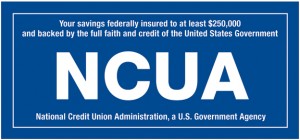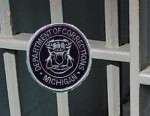
This sign, displayed at all credit unions, informs members that their savings are insured by the NCUA. (Source: Wikipedia.com)
In a sign of how widespread the nation’s financial crisis has become, even the credit unions are getting creamed.
Problems in the credit union system, once considered a largely mom-and-pop operation immune to turmoil, came to light last week, when their regulator seized two of the nation’s largest credit unions, U.S. Central Credit Union in Lenexa, Kanss, and Western Corp. Federal Credit Union in San Dimas, Calif. The two, with combined assets of $57 billion, are in trouble over the same investments in toxic mortgage backed securities that have felled global banks and led to the credit crunch.
Cracks in the credit union system are showing the breadth of the crisis – and raising the possibility of another institution looking to the government for help. In a mirror of the dilemma facing the Federal Deposit Insurance Corp, the insurance fund for credit unions has been depleted by the seizure. Smaller credit unions may have to pony up big fees to replenish it – at the same time economy is hitting them hard, causing depositors to pull out their savings for living expenses. All of it is creating a liquidity squeeze that only threatens to become more severe, said Gerald Hanweck, a finance professor at George Mason University who follows the credit union industry.
“A lot of their membership is becoming unemployed,” Hanweck said. “If the recession keeps getting worse, it’s going to cause a lot of problems for them. More and more credit unions are going to fail.”
The failure of the two large corporate credit unions, which handle investments and other services for the 7,800 traditional retail credit unions, may become a turning point, proving that the industry needs more oversight, Hanweck and others said. The system includes 26 other corporate credit unions, as well as the two that were seized. Yet the credit union industry remains overseen by its own, individual regulator – the National Credit Union Administration, an independent federal agency considered by many as mostly as a cheerleader for the credit union movement, Hanweck said.
All the turmoil could mean that credit unions may become swept up in the Obama administration’s financial regulatory system overhaul, and put under closer supervision by Congress or the FDIC, in addition to requiring a government bailout or some type of federal aid.
“They consider themselves to be a movement, and their regulator doesn’t want to overregulate or be too restrictive,” Hanweck said. “But that’s contributed a considerable degree to their problems. The whole notion of a corporate credit union has to be re-thought. If they’re going to act like a bank, they need to be regulated like a bank.”
Even as the economy worsened, credit unions couldn’t tap Troubled Assets Relief Program money because they don’t issue preferred stock. The government bailout program is limited to institutions that do so. But credit unions are trying to find out whether they will be eligible to participate in the new Treasury Department plan to subsidize the purchase of toxic assets, said John McKechnie, a lobbyist and spokesman for the NCUA. The industry believes it should be eligible but doesn’t have enough information on the program yet, he said.
The industry also may look to Washington for additional money, even as it charges the retail credit unions to replenish the insurance fund. The NCUA estimates that it could cost as much as $5.9 billion to stabilize the corporate credit union system by rebuilding the fund, or more than the industry’s entire profit for last year. That cost could trickle down to customers, in the form of higher fees for loans and other services. The regulator also said total losses to the credit union system due to toxic securities could reach as high as $16 billion.
Treasury Secretary Timothy Geithner may not have had credit unions in mind when he put together his plan to buy up toxic assets, because the industry previously had been considered safe from the difficulties facing other financial services firms. But saying no to any kinds of government aid for credit unions would be a difficult thing to do, said George Overstreet, a professor at University of Virginia’s McIntire School of Commerce who specializes in banking and credit.
“Do you really think Washington wouldn’t bail out the poor old credit unions?” Overstreet said. “If they bailed out that sorry Citigroup and AIG, they’re going to have to bail them out too. At this point, what’s another few billion here and there?”
Credit unions, which are owned and run by their members, and are tax exempt, originated in Germany and became popular in the 1920s in the United States, when workers needed loans to begin buying automobiles and washing machines. The system now counts 90 million Americans as members. The 27 corporate credit unions serve as mini-Federal Reserves for the retail ones, providing loans and making investments on their behalf. Finally, there’s the U.S. Central Credit Union, which serves all the corporate credit unions – and was one of the two seized by the NCUA.
The NCUA website explains that the regulator took over the two corporate credit unions after an independent stress test by the Pimco investment firm found that losses tied to mortgage-backed securities were greater than thought initially, and threatened their viability.
“We were not prepared to let them fail,” McKechnie said. “It could have had a domino effect on the system, and we needed to stabilize the system.”
While times are difficult right now for credit unions, McKechnie said the system overall is still safe and stable. NCUA Chairman Michael Fryzel testified recently before Congress that the credit union system is unique, and requires its own regulator.
But emotions are running high on credit union websites, as members complain about paying to replenish the fund, debate whether mismanagement led to the problems, and contend that it was unfair for credit unions to be shut out of TARP funds.
Mike Moebs, an economist and president of Moebs Services, a financial industry consulting and research firm in Lake Bluff, Ill., said he believes it was a mistake to exclude the credit unions from TARP money, even if it wasn’t done intentionally. “I don’t think they can get out of this problem by themselves,” he said. “The corporate credit unions are the weak link. And they’re one of the weakest links in the whole financial system.”
Moebs said he thinks the credit union system should temporarily borrow money from Treasury to replenish the insurance fund, as the FDIC has done, or seek money from the Federal Reserve. The credit union industry also should pursue more relaxed requirements for the amount of money it needs to cover losses, and for its insurance fund. But credit unions don’t need to be regulated like banks, he said.
“I don’t think it’s time to say, ‘Let’s eliminate the credit unions,’” Moebs said. “I think that would be an injustice. They’ve shown themselves to be of value, a source for the American consumer for auto loans and consumer loans and many other kinds of lending.”
But even before the most recent crisis, complaints had been growing over the corporate credit unions jumping into the global securities market without the required expertise or oversight. In 1995, credit union regulators seized the Capital Corporate Federal Credit Union in Maryland, after it tallied up $100 million in losses in bad mortgage investments.
“The NCUA should have known better, after CapCorp.,” said George Mason’s Hanweck. “And this time around, the corporate credit unions really got caught up in all this.”
Marvin Umholtz, a financial consultant and former lobbyist for the credit unions, said the failures of the two corporate credit unions highlight the problem with “interconnectedness” – meaning troubles at the corporate credit unions infect the entire credit union industry. “The flaws in the system are showing,” Umholtz said.
And those flaws mean one more institution thought to be safe is yet another casualty, in a financial crisis that shows no end to its reach.
Mary Kane writes about the economy for Michigan Messenger’s sister site,The Washington Independent.



